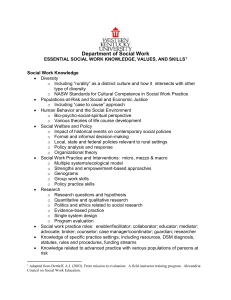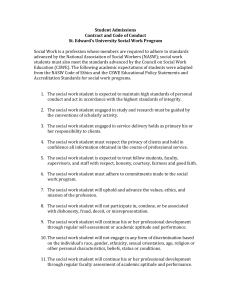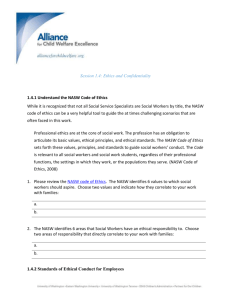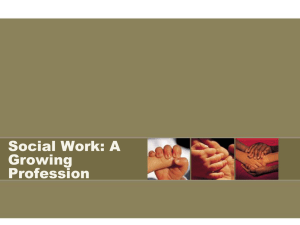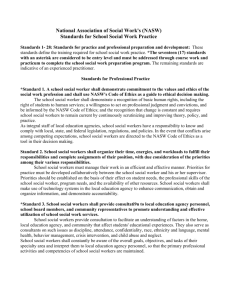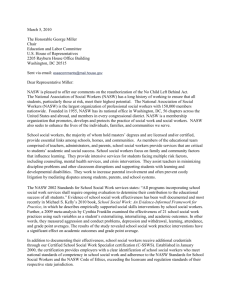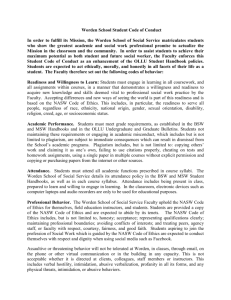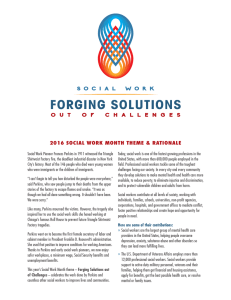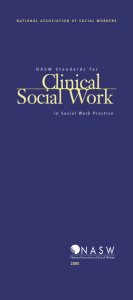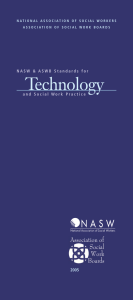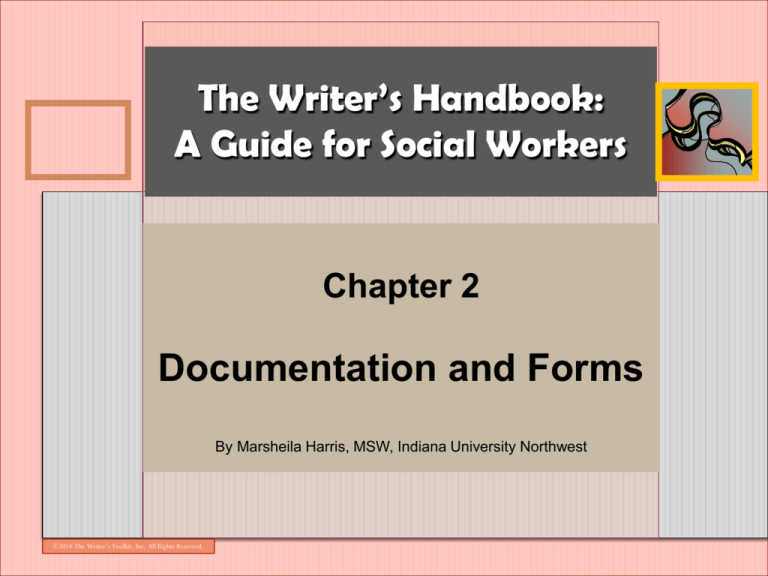
The Writer’s Handbook:
A Guide for Social Workers
Chapter 2
Documentation and Forms
By Marsheila Harris, MSW, Indiana University Northwest
©2014 The Writer’s Toolkit, Inc. All Rights Reserved.
If it is not written, it did not
happen.
In social work, this saying speaks to the
urgency of maintaining strong documentation
in the field.
Social workers must submit well-written forms
and documents for the agency and for external
service providers and collaborators.
Reports are routinely sent to the courts,
medical community, criminal justice
departments, and other agencies as part of a
case file that serves as an official document.
The reports are used to assist in decision
making for the client’s well-being and to
provide services or resources.
National Association of Social
Workers (NASW)
The NASW Code of Ethics are at the core of
social work, providing guidance to social
workers about commitment to clients,
confidentiality, and professionalism.
The NASW Code of Ethics articulates basic
values, ethical principles, and ethical
standards to guide social workers’ conduct.
NASW Code of Ethics
The National Association of Social Workers Code of
Ethics also addresses the need for accurate and
professional documentation (2008).
To view the entire code, go to the NASW website:
http://www.socialworkers.org/pubs/code/code.asp
Let’s take a look at some parts of the code that relate to
documentation.
1.07. Privacy and Confidentiality
a.
Social workers should respect clients’ right to
privacy . . . and not solicit private information unless
it is essential to providing services or conducting
social work evaluation or research. Once private
information is shared, standards of confidentiality
apply.
b.
Social workers may disclose confidential
information when appropriate with valid consent
from a client or a person legally authorized to
consent on behalf of a client.
c.
Social workers should protect the confidentiality of
all information obtained in the course of
professional service, except for compelling
professional reasons . . . only information that is
directly relevant to the purpose for which the
disclosure is made should be revealed.
d.
Social workers should inform clients, to the extent
possible, about the disclosure of confidential
information and the potential consequences . . . .
3.04 Client Records
a. Social workers should take reasonable steps to
ensure that documentation in records is
accurate and reflects the services provided.
b. Social workers should include sufficient and
timely documentation in records to facilitate the
delivery of services and to ensure continuity of
services provided to clients in the future.
c.
Social workers’ documentation should protect
clients’ privacy to the extent that is possible and
appropriate and should include only information that
is directly relevant to the delivery of services.
d.
Social workers should store records following the
termination of services to ensure reasonable future
access. Records should be maintained for the
number of years required by state statutes or relevant
contracts.
1.12 Derogatory Language
Social workers should not use derogatory
language . . . . Social workers should use accurate
and respectful language in all communications to
and about clients.
NASW Press Guidelines for
Describing People (2011)
The purposes of the guidelines are to help
authors
portray people as accurately and vividly as
possible
eliminate bias from their writing
incorporate the richness of cultural diversity
use language that is accessible and inviting to the
reader.
NASW Press Guidelines
Seek and use the preference of the people you
write about.
Ask people how they prefer to be described
Be as specific as possible.
Whenever possible, use specific racial or ethnic
identities instead of collecting different groups
under a general heading, such as Hispanics.
Cite actual ages rather than using a term such as
older people or senior citizens.
Describe people in the positive.
Describe people for what they are rather than
what they are not; do not use terms such as
nonwhite or nonparticipant.
Help the reader see that you are writing about
people, not subjects or objects.
Use the terms sample or subject for statistics
and describe participants as respondents,
participants, workers, and so forth.
Avoid using terms that label people.
When adjectives that describe a person's
condition or status are used as nouns, they
become labels that often connote a
derogatory intent.
People who have lived a long time become the
elderly or the aged; if you cannot use specific
ages or age ranges, use terms such as elders or
older people.
Using “the” in front of a noun is a sign that
you may be using a label.
Labels
Revised
the disabled
people with disabilities
the handicapped
people with disabilities
the blind
people who are blind
the lower class
people who are poor
the upper class
people with high incomes
the disadvantaged
people who have disadvantages
Use gender-neutral language.
Outdated
Current
policemen
police officers
housewife
homemaker
mailman
mail carrier
fireman
firefighter
chairman
chairperson
salesman
sales representative
Can you think of more examples?
Use plural nouns to avoid singular,
gender-specific pronouns.
Gender biased:
A social worker should consider his mission . . .
A social worker should consider her mission . . .
Incorrect:
A social worker should consider their mission . . .
Revised:
Social workers should consider their mission . . .
More Examples
Poor Usage
Revised
schizophrenics
people diagnosed with schizophrenia
challenged
people with challenges
wheelchair-bound
uses a wheelchair
AIDS victims
people with AIDS
high-risk groups
high-risk behavior
minority
racial and ethnic groups
tribes
people or nations
blacks
black people
nonwhites
specific population
Hispanic
Cuban Americans, Mexican Americans,
Puerto Ricans
You will find the NASW Press Guidelines for
Describing People in their entirety at the following:
https://www.naswpress.org/authors/guidelines/08ctools.html
The guidelines are also posted at your text’s website:
www.thewriterstoolkit.com
Click on the Social Work Resources tab.
Documentation in the Field
Court Summaries
Social Histories
Client Intake Forms
Treatment Plans
Case Notes
Case Notes
Case notes are professional records of the
case worker’s interaction with the client, providing
a documentation of what was discussed, agreed
upon, or unresolved.
Case notes serve as proof of the case worker’s
contact and whether or not the client is compliant
with services.
Case notes have moved from being handwritten
to being completed using a computerized
template.
Case Notes
Client Name:
ID No.
Case Worker Name:
Date of Interaction:
Case Notes:
Date of Birth
Questions
Throughout your process:
Separate composing from editing

